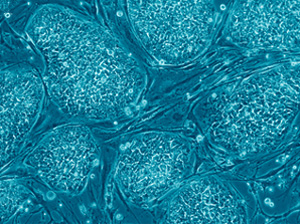
Stem Cells
In a last-ditch effort to save the life of teenager Dave Stahl in 1975, Dr. John Kersey of the University of Minnesota performed the first successful bone marrow transplant to treat Burkitt's lymphoma, a fatal form of cancer. Bone marrow contains stem cells, cells that are capable of developing into any of number of related cell types. Kersey had learned from his mentor, Dr. Robert Good, that these cells might be used to attack cancer. Kersey's pioneering operation was successful and initiated three decades of research into the medical potential of stem cells — as well as three decades of controversy.
Why? Because although stem cells can be harvested from a variety of sources, including adult cells, or what are known as induced-pluripotent cells, researchers still believe the stem cells most effective in fighting human diseases come from human embryos. A number of groups, many from religious backgrounds, have vocally opposed stem cell research because they believe harvesting cells from human embryos is ethically wrong. Other groups have argued just as vocally that the benefits to human life from stem cell research are profound, and that such research is therefore a moral imperative.
What is your opinion regarding the use of stem cells in medicine? Should the federal government publicly fund stem cell research, as it funds many other kinds of therapeutic research?
The ethical nuances of these questions make your position on this issue a very personal matter. But the ability to articulate your position cogently requires a rich understanding of the scientific and medical facts behind this debate, as well as a deep familiarity with the nature of the relationship between government and science. In this Spotlight, you will find a range of resources intended to help you master the details and subtle distinctions in the stem cell debate.
Image: Nissim Benvenisty.
What are stem cells?
This video introduces you to the science of stem cells.
Listen to the history of the first successful bone marrow transplant for cancer.
This NIH site is a great resource for exploring the basics and details of stem cell use.
How are stem cells manufactured?
Take a look inside the nation's largest stem cell manufacturer whose mission is to further our understanding of human biology and improve human health.
Watch a video about induced pluripotent stem cells (iPS), which are reverse-engineered from mature, differentiated cells found in body tissue, a non-embryonic resource for stem cells.
Tissue-derived stem cells (iPS) were orginally made from skin cells. But recently, researchers have found that fat cells may be a more efficient resource. Scientific American explains why.
How are stem cells used in medicine?
A brief, readable summary of stem cell transplantation by the Mayo Clinic.
View a slide show to understand embryonic stem cell cloning.
Read the International Society of Stem Cell Research's handbook (pdf).
The government landscape
Watch a video of President Obama's Executive Order to reverse the limitations imposed by the previous administration, and allow government funding of stem cell research.
Listen to a New Yorker interview with President Obama's science advisor, Dr. Harold Varmus, about the reasons behind federal funding of stem cell research.
Learn more about the NIH's recently created Stem Cell Unit and the national guidelines governing stem cell research, made possible by new legislation.
Ethics of stem cell research
This argument in favor of stem cell research primarily focuses on the moral imperative to empathize with patients suffering from debilitating chronic pain.
The United States Conference of Catholic Bishops offers arguments that stem cell research violates the fundamental right to life by destroying embryonic cells.
Take NOVA's survey about stem cell research and discover the nuances of the debate. You may find yourself agreeing rather than disagreeing with the other side.



























